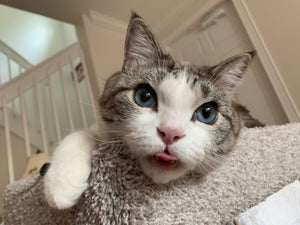What to Avoid in Pet Food
All pet foods are not created equal. Some pet food companies insert ingredients into their product that can endanger the health of your dog or cat if they consume that food.
This point was hammered home when Natura Pet Products announced a recall during April on all dry food products for dogs and cats. Natura issued the recall for products with expiration dates on or before March 24th, 2014 after discovering some dry food had been contaminated with salmonella bacteria. Cats or dogs infected with salmonella can experience decreased energy, diarrhea, fever and vomiting. Salmonella bacteria can also be spread to their owners and cause similar health problems. Poison prevention from food source is very important to be aware of.
Taking care of your cat or dog starts with feeding them food that will make them healthy and strong. How do you know what is good for your pet and what will endanger their health? Reading food labels is a good way of educating yourself which foods contain harmful ingredients.
When you are shopping for pet food, avoid buying foods with these ingredients listed on the label:

Meat by-products
Typical meat by-products include organs such as:- Lungs
- Spleens
- Kidneys
- Brains
- Livers
- Stomachs
- Intestines
They can also include blood, bone and fatty tissues. These by-products are ground into a coarse meal that can be cooked into dry food or mixed in with wet food. In many cases, material for meal and other by-products is drawn from dead, dying, diseased, or disabled animals that were judged not fit for human consumption before being taken to the rendering plant.
Corn, Wheat & Soy
It seems crazy to think grains would be bad for your pet. The truth is that corn, wheat, and soy are a common source of food allergies and sensitivities for your cat or dog. Carnivores do not have digestive systems equipped to handle carbohydrates and draw no nutrition from grains. Pet food manufacturers dump corn, wheat, or soy into their food as a cheap protein replacement. However, they actually offer no health benefit to your pet.

Artificial Colors and Preservatives
Many preservatives and dyes used in pet foods have been linked to causing cancer and other serious health problems. Some preservatives such as BHA and BHT are actually banned from use in human products in many countries because of the health risks they pose. Ethoxyquin, another common pet food preservative, is commonly used as a pesticide.
Keep these ingredients in mind when you are shopping for your next batch of dog food or cat food. As in eating for humans, the general rule is the less processed foods you put in your system the healthier you’ll be.
And of course, avoid giving your pet any chocolate. It is equally harmful to dogs and cats.
Many pet owners have also turned to raw or veggie dog diets for one reason or another regarding their pets' health. Take a look to see if Raw or Vegetarian Diets are right for your pup!




